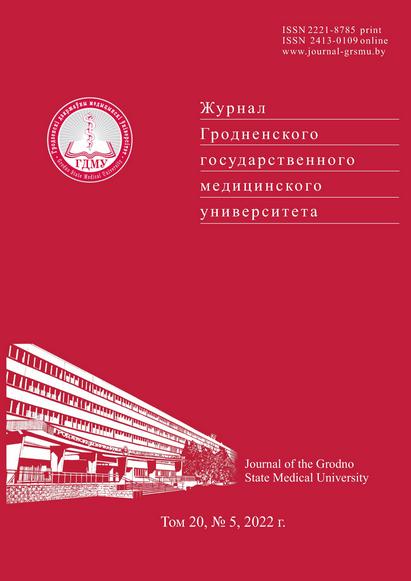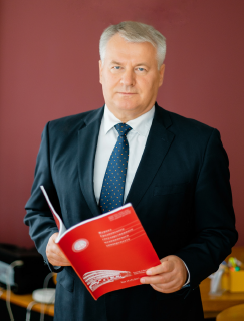СОВРЕМЕННЫЙ ВЗГЛЯД НА КОНДИЦИОНИРОВАНИЕ ДОНОРОВ СО СМЕРТЬЮ ГОЛОВНОГО МОЗГА

Аннотация
Актуальность проблемы кондиционирования доноров со смертью головного мозга обусловлена сохраняющейся летальностью как у пациентов, находящихся в листе ожидания, так и у пациентов после пересадки органов, а также утратой функции самого трансплантата. Подход к ведению доноров со смертью головного мозга схож с лечением критических пациентов в отделениях анестезиологии и реанимации, но имеет ряд особенностей, которые необходимо учитывать во время кондиционирования. В статье описаны сведения о современных методах кондиционирования доноров со смертью головного мозга, указывающих на то, что своевременное начало и комплексный подход в кондиционировании доноров позволяют улучшить результаты пересадки органов. На основе клинических наблюдений установлено, что каждого потенциального донора необходимо расценивать как мультиорганного и рассматривать наибольшее количество органов возможными для последующей пересадки, что подразумевает применение комплексного подхода, направленного на сохранение функционирования всех органов донора. Если же имеются противопоказания к забору тех или иных органов, проводимые мероприятия должны быть направлены в первую очередь на сохранение органа, планируемого для пересадки, а уже потом – на поддержание адекватной функции остальных органов и систем.
Литература
Pikirenja II, Lavrinjuk RP, Rummo OO, Dzjadzko AM, Bolonkin LS, Grusha VV. Donorstvo organov. Minsk: BelMAPO; 2013. 45 p. (Russian).
Vinogradov VL. Vedenie potencialnogo donora so smertju mozga (chast 1) [Management of a potential donor with brain death (part 1)]. Transplantologija [Transplantologiya. The Russian Journal of Transplantation]. 2014;3:23-31. edn: SQVDWT. (Russian).
Kutsogiannis DJ, Pagliarello G, Doig C, Ross H, Shemie SD. Medical management to optimize donor organ potential: review of the literature. Can J Anaesth. 2006;53(8):820-830. https://doi.org/10.1007/BF03022800.
Rosengard BR, Feng S, Alfrey EJ, Zaroff JG, Emond JC, Henry ML, Garrity ER, Roberts JP, Wynn JJ, Metzger RA, Freeman RB, Port FK, Merion RM, Love RB, Busuttil RW, Delmonico FL. Report of the Crystal City meeting to maximize the use of organs recovered from the cadaver donor. Am J Transplant. 2002;2(8):701-711. https://doi.org/10.1034/j.1600-6143.2002.20804.x.
McKeown DW, Bonser RS, Kellum JA. Management of the heartbeating brain-dead organ donor. Br J Anaesth. 2012;108(Suppl 1):96-107. https://doi.org/10.1093/bja/aer351.
Rodrigues SL, Ferraz Neto JB, Sardinha LA, Araujo S, Zambelli HJ, Boin IF, Athayde MV, Montone EB, Panunto MR. Profile of effective donors from organ and tissue procurement services. Rev Bras Ter Intensiva. 2014;26(1):21-27. https://doi.org/10.5935/0103-507x.20140004.
Dhanwate AD. Brainstem death: A comprehensive review in Indian perspective. Indian J Crit Care Med. 2014;18(9):596-605. https://doi.org/10.4103/0972-5229.140151.
Goila AK, Pawar M. The diagnosis of brain death. Indian J Crit Care Med. 2009;13(1):7-11. https://doi.org/10.4103/0972-5229.53108.
Kotloff RM, Blosser S, Fulda GJ, Malinoski D, Ahya VN, Angel L, Byrnes MC, DeVita MA, Grissom TE, Halpern SD, Nakagawa TA, Stock PG, Sudan DL, Wood KE, Anillo SJ, Bleck TP, Eidbo EE, Fowler RA, Glazier AK, Gries C, Hasz R, Herr D, Khan A, Landsberg D, Lebovitz DJ, Levine DJ, Mathur M, et al. Management of the Potential Organ Donor in the ICU: Society of Critical Care Medicine/American College of Chest Physicians/Association of Organ Procurement Organizations Consensus Statement. Crit Care Med. 2015;43(6):1291-1325. https://doi.org/10.1097/CCM.0000000000000958.
Hahnenkamp K, Böhler K, Wolters H, Wiebe K, Schneider D, Schmidt HH. Organ-Protective Intensive Care in Organ Donors. Dtsch Arztebl Int. 2016;113(33-34):552-558. https://doi.org/10.3238/arztebl.2016.0552.
Pandit RA, Zirpe KG, Gurav SK, Kulkarni AP, Karnath S, Govil D, Abhram B, Mehta Y, Gupta A, Hegde A, Patil V, Bhatacharya P, Dixit S, Samavedan S, Todi S. Management of Potential Organ Donor: Indian Society of Critical Care Medicine: Position Statement. Indian J Crit Care Med. 2017;21(5):303-316. https://doi.org/10.4103/ijccm.IJCCM_160_17.
Barklin A, Tonnesen E, Ingerslev J, Sorensen B, Fenger-Eriksen C. Coagulopathy during induced severe intracranial hypertension in a porcine donor model. Anesthesiology. 2009;110(6):1287-1292. https://doi.org/10.1097/ALN.0b013e3181a10352.
Talving P, Benfield R, Hadjizacharia P, Inaba K, Chan LS, Demetriades D. Coagulopathy in severe traumatic brain injury: a prospective study. J Trauma. 2009;66(1):55-61. https://doi.org/10.1097/TA.0b013e318190c3c0.
Wong J, Tan HL, Goh JP. Management of the brain dead organ donor. Trends Anaesth Crit Care. 2017;13:6-12. https://doi.org/10.1016/j.tacc.2016.11.004.
de Vries DK, Lindeman JH, Ringers J, Reinders ME, Rabelink TJ, Schaapherder AF. Donor brain death predisposes human kidney grafts to a proinflammatory reaction after transplantation. Am J Transplant. 2011;11(5):1064-1070. https://doi.org/10.1111/j.1600-6143.2011.03466.x.
Rech TH, Moraes RB, Crispim D, Czepielewski MA, Leitão CB. Management of the brain-dead organ donor: a systematic review and meta-analysis. Transplantation. 2013;95(7):966-974. https://doi.org/10.1097/TP.0b013e318283298e.
Rey JW, Ott T, Bösebeck D, Welschehold S, Galle PR, Werner C. Organ protective intensive care treatment and simulation-based training. Anaesthesist. 2012;61(3):242-248. https://doi.org/10.1007/s00101-012-1990-8. (German).
de Groot YJ, Jansen NE, Bakker J, Kuiper MA, Aerdts S, Maas AI, Wijdicks EF, van Leiden HA, Hoitsma AJ, Kremer BH, Kompanje EJ. Imminent brain death: point of departure for potential heart-beating organ donor recognition. Intensive Care Med. 2010;36(9):1488-1494. https://doi.org/10.1007/s00134-010-1848-y.
Vinogradov VL. Vedenie potencialnogo donora so smertju mozga (chast 2) [Management of a potential donor with brain death (part 2)]. Transplantologija [Transplantologiya. The Russian Journal of Transplantation]. 2015;1:41-47. edn: TPMVDT. (Russian).
Mascia L, Pasero D, Slutsky AS, Arguis MJ, Berardino M, Grasso S, Munari M, Boifava S, Cornara G, Della Corte F, Vivaldi N, Malacarne P, Del Gaudio P, Livigni S, Zavala E, Filippini C, Martin EL, Donadio PP, Mastromauro I, Ranieri VM. Effect of a lung protective strategy for organ donors on eligibility and availability of lungs for transplantation: a randomized controlled trial. JAMA. 2010;304(23):2620-2627. https://doi.org/10.1001/jama.2010.1796.
Blasi-Ibanez A, Hirose R, Feiner J, Freise C, Stock PG, Roberts JP, Niemann CU. Predictors associated with terminal renal function in deceased organ donors in the intensive care unit. Anesthesiology. 2009;110(2):333-41. https://doi.org/10.1097/ALN.0b013e318194ca8a.
Barklin A. Systemic inflammation in the brain-dead organ donor. Acta Anaesthesiol Scand. 2009;53(4):425-435. https://doi.org/10.1111/j.1399-6576.2008.01879.x.
Murugan R, Venkataraman R, Wahed AS, Elder M, Hergenroeder G, Carter M, Madden NJ, Powner D, Kellum JA. Increased plasma interleukin-6 in donors is associated with lower recipient hospital-free survival after cadaveric organ transplantation. Crit Care Med. 2008;36(6):1810-1816. https://doi.org/10.1097/CCM.0b013e318174d89f.
Kumar L. Brain death and care of the organ donor. J Anaesthesiol Clin Pharmacol. 2016;32(2):146-152. https://doi.org/10.4103/0970-9185.168266.
Franklin GA, Santos AP, Smith JW, Galbraith S, Harbrecht BG, Garrison RN. Optimization of donor management goals yields increased organ use. Am Surg. 2010;76(6):587-94. https://doi.org/10.1177/000313481007600621.
Klein AS, Messersmith EE, Ratner LE, Kochik R, Baliga PK, Ojo AO. Organ donation and utilization in the United States, 1999-2008. Am J Transplant. 2010;10(4):973-986. https://doi.org/10.1111/j.1600-6143.2009.03008.x.
Callahan DS, Neville A, Bricker S, Kim D, Putnam B, Bongard F, Plurad DS. The effect of arginine vasopressin on organ donor procurement and lung function. J Surg Res. 2014;186(1):452-457. https://doi.org/10.1016/j.jss.2013.09.028.
Plurad DS, Bricker S, Falor A, Neville A, Bongard F, Putnam B. Donor hormone and vasopressor therapy: closing the gap in a transplant organ shortage. J Trauma Acute Care Surg. 2012;73(3):689-694. https://doi.org/10.1097/TA.0b013e318250b122.
Plurad DS, Bricker S, Neville A, Bongard F, Putnam B. Arginine vasopressin significantly increases the rate of successful organ procurement in potential donors. Am J Surg. 2012;204(6):856-860. https://doi.org/10.1016/j.amjsurg.2012.05.011.
Findlater C, Thomson EM. Organ donation and management of the potential organ donor. Anaesth Intensive Care Med. 2015;16(7):315-320. https://doi.org/10.1016/j.mpaic.2015.04.013.
Mi Z, Novitzky D, Collins JF, Cooper DK. The optimal hormonal replacement modality selection for multiple organ procurement from brain-dead organ donors. Clin Epidemiol. 2014;7:17-27. https://doi.org/10.2147/CLEP.S71403.
Novitzky D, Mi Z, Sun Q, Collins JF, Cooper DK. Thyroid hormone therapy in the management of 63,593 brain-dead organ donors: a retrospective analysis. Transplantation. 2014;98(10):1119-1127. https://doi.org/10.1097/TP.0000000000000187.
Glucocorticoids alter the balance between pro- and anti-inflammatory mediators in the myocardium in a porcine model of brain death. J Heart Lung Transplant. 2007;26(1):78-84. https://doi.org/10.1016/j.healun.2006.10.011.
Kainz A, Wilflingseder J, Mitterbauer C, Haller M, Burghuber C, Perco P, Langer RM, Heinze G, Oberbauer R. Steroid pretreatment of organ donors to prevent postischemic renal allograft failure: a randomized, controlled trial. Ann Intern Med. 2010;153(4):222-230. https://doi.org/10.7326/0003-4819-153-4-201008170-00003.
Carrott P, Cherry-Bukowiec JR, Jones CM, Miller KR, Kiraly L. Nutrition therapy in the organ donor: theoretical benefits and barriers to implementation. Curr Nutr Rep. 2016;5:199-203. https://doi.org/10.1007/s13668-016-0170-x.






























